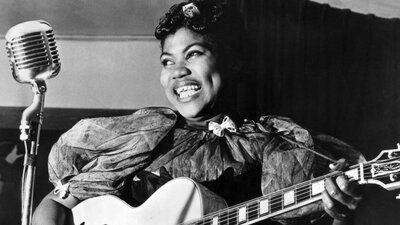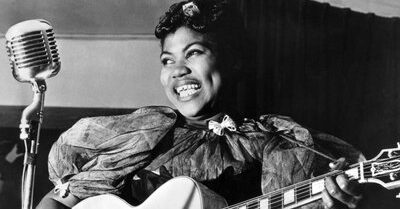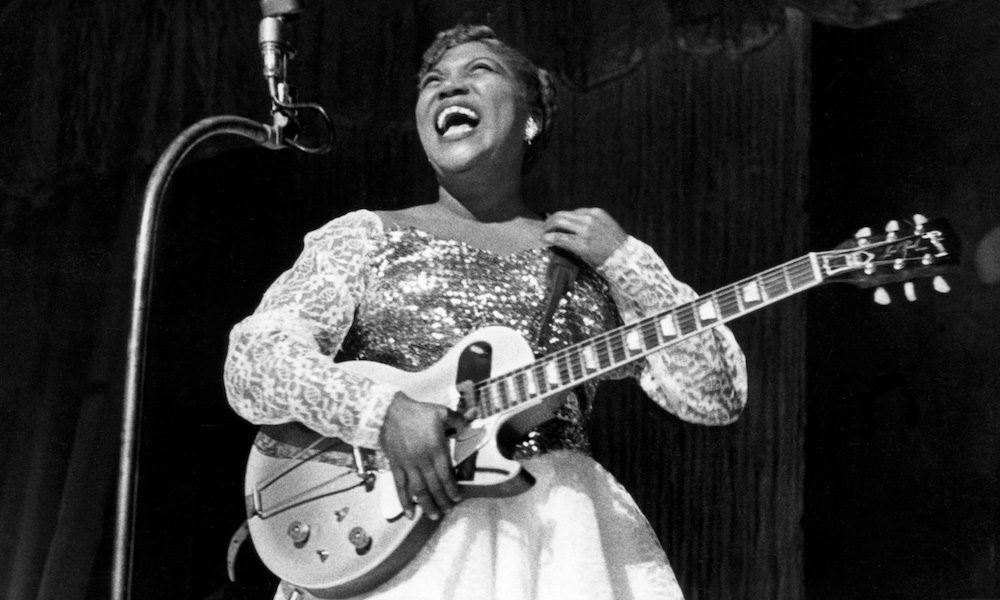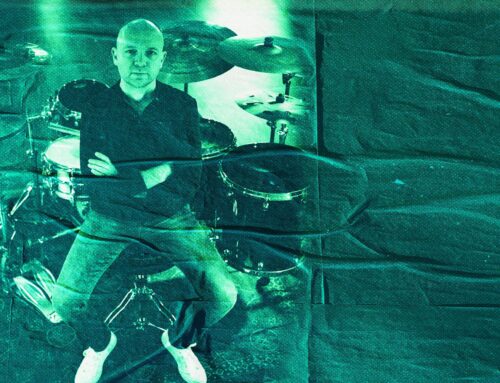This year, to celebrate Pride Month and the many heroes and musical icons who were/are a part of the LGBTQ+ Community, The Collective has decided to turn its gaze backward to celebrate one of the most influential and unsung musicians of the 20th Century: Sister Rosetta Tharpe. Known as “The Godmother of Rock and Roll” Tharpe has been cited as an influence by the likes of Johnny Cash, Little Richard, and even Elvis Presley, as the origins of their style. But how did history and pop culture at large lose the origin point of one of America’s most important and popular music styles for so long?
Sister Rosetta Tharpe was beginning to take hold of both the nightclubs and the churches around Chicago in the 1930’s, but as a primarily Gospel musician. Known for her commanding presence, unique guitar picking technique, and controversial songwriting conventions of merging secular songs with the spiritual, Tharpe was a musical force to be reckoned with. Crowds of fans were already beginning to search out her fusion of the Delta Blues and Jazz with more traditional spiritual/worship styles, but it wasn’t until her arrival at the Cotton Club Revue in New York City at the age of 23 where the Godmother would begin to demand attention on a national stage.

Her style became more reminiscent of the Rock and Roll she pioneered in the late 30’s to early 40’s. With early hits like “Rock Me” showing off her more swaggered, hyperactive vocal stylings- those that would become a mainstay in Rock and Roll to come. As Bob Dylan would eventually mention on his Theme Time Radio Hour Show, “Sister Rosetta Tharpe was anything but ordinary and plain. She was a big, good-lookin’ woman and divine, not to mention sublime and splendid.” These factors on top of the rarity that was a female guitarist at the time that dared to stand out with her trailblazing sound, made Tharpe an instant celebrity. She would collaborate amongst the likes of Duke Ellington and popular swing band the Lucky Millinder Orchestra throughout this time. Leading to one of her biggest hits in 1944 during the height of World War II: “Strange Things Happen Every Day” with Sammy Price on the piano. This, was song that many cite was Tharpe’s creation of Rock and Roll. It would reach No. 2 On the Billboard’s then-segregated “Race Records” charts that year.
According to the PBS documentary “Sister Rosetta Tharpe: The Godmother of Rock and Roll” It was around the age of 30 that Tharpe became open about her bisexuality within the music industry, becoming romantically engaged with her musical partner Marie Knight. Already being seen as an oddity in the world of popular music being a black woman playing the guitar for now mixed-race audiences, Their next hit “Up Above My Head” would then lead to them touring around the country together. While it might not seem such a bold decision now, NPR would state it plainly: “They toured, collaborated and performed as two queer black women in a relationship in the late 1940s; it was a radical act.” Tharpe would continue to develop her sound in this time, even being one of the first musicians to adopt heavy distortion effects on her electric guitar according to Bisexual advocacy site Bi.org
Tharpe would eventually break up her partnership with Marie Knight, and marry her manager, Russel Morrison, in 1950. While the popular music world in America would begin to leave her behind, Tharpe took to Europe and toured there for the rest of her life until passing away from a stroke in 1973 in Philadelphia. One of her most famous performances would occur on recording in 1964 in Manchester, as she played the hit, “Didn’t It Rain” in 1964, while it showered. The crowd of English fans went absolutely wild for her expressive voice, and mastery over the electric guitar she soloed away and crooned with in her large dress and heels.
While the Godmother changed the world and inspired the birth of Rock and Roll, her name was relatively obscure for quite some time after her death. Perhaps it was because of how many norms she broke. The world at the time wasn’t ready to admit that an openly Bisexual Black Woman was as important, or as talented as Tharpe truly was was, so culture quietly faded her name in the story of music. Knowing now that Western Popular Music at large is owed largely to members of both the Black and LGBTQ+ Communities in America It would take the likes of popular artists and scholars almost 50 years after her time championing her name to unveil the historical truth:
Rock and Roll, seen as a space for predominantly white, male musicians, was trail-blazed by a confident, virtuosic, god-fearing, queer black woman breaking down nearly every norm imaginable.
Tharpe was eventually inducted into the Rock And Roll Hall of Fame in 2018 by Grammy Award-Winning Rock and RnB musician Brittany Howard, being touted as “The first guitar heroine of rock & roll. Her heartfelt gospel folksiness gave way to her roaring mastery of her trusty Gibson SG, which she wielded on a level that rivaled the best of her male contemporaries.” and though it was a long time overdue, Sister Rosetta Tharpe’s legacy is now heard, her song now sung, and her influence and character felt by generations of Rock And Roll Musicians to come. Sister Rosetta Tharpe is proof that anyone can Rock, and if you put your soul into the music, the music will speak forever.







